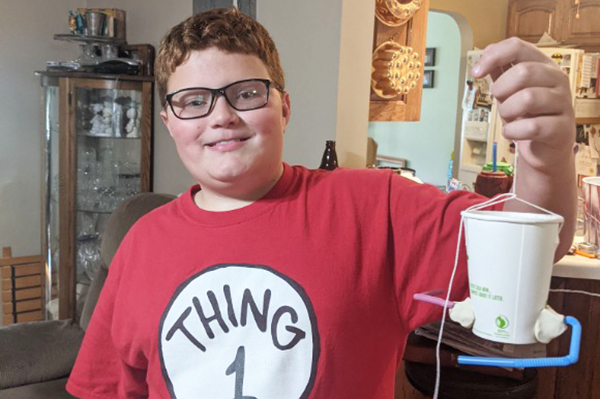TCE Summer Outreach Program Recap

The Tickle College of Engineering held several different summer programs for K-12 students this June and July. These programs, held both remotely and on campus, gave students the opportunity to learn more about engineering.
Summer STEM Quest
Students in elementary and middle school were given the opportunity to sign up for the Summer STEM Quest. Each student received a STEM kit with four different activities they could do over the course of the summer. They were also given instructions on how to access supplementary materials and videos related to the STEM topics like density, Newton’s laws, and computer science. Overall, kits were sent to 30 families across the state of Tennessee.
In addition, there was also a Summer Robotics Quest where students were given the opportunity to make a biomimetic robot. This remote opportunity was restricted to high school students, and the students who participated were inspired by animals like a swan, and plants like the venus fly trap, when creating their robots. All of these programs were funded in part by a grant from the Office of Community Outreach and Engagement.
Summer Energy Scholars
CURENT Engineering Research Center held a two-week Summer Energy Scholars program instead of their month-long Young Scholars Program. The Summer Energy Scholars program introduced high school students to power engineering topics, specifically those related to renewable energy, electric vehicles, and the use of microgrids. During the second week, participants were given the opportunity to learn about circuits using an Arduino and breadboard. They completed a solar build project where they were able connect a solar panel to the circuit board and gather measurements using the Arduino. UT students Elinor Heenie, Elizabeth Sutton, and Jay Vahaly worked with five engineering ambassadors from Rensselaer Polytechnic Institute (RPI), one of CURENT’s partner schools, to plan and teach the solar build program.
For more information on how to complete the solar build program in your classroom, please contact either Anne Skutnik (tceoutreach@utk.edu) or Elizabeth Herkenham at RPI (herkee2@rpi.edu)
Pre-College Programs
Each year, TCE hosts an experience for incoming twelfth grade students entitled, High School Introduction to Engineering Systems for Twelfth Graders (HITES12). The objective is to introduce students to engineering and showcase the applications of math and science to high school participants. The experience provides an opportunity for students to learn about careers in engineering, virtually explore campus life and services, virtually tour engineering labs and facilities, compete in virtual engineering challenges, and jump start their academic career. Thirty-one students participated in the first week’s experience, and 24 in the second week. All participants were sent kits for the experience.
SEA Program
The Summer Engineering Advancement (SEA) program is a 3-week residential program intended to provide first-year underrepresented minority engineering students who place into pre-calculus mathematics, the opportunity to take math seminars and placement tests to advance into calculus I level mathematics in the fall semester. Additionally, students will take an Introduction to Engineering Fundamentals seminar to give them exposure to applied physics and engineering as well as student life seminars focused on resources, departments, and topics related to their undergraduate experience. Twenty-six students (13 women, 13 men) attended the summer program. Fifty percent of these students were underrepresented minorities. In terms of outcomes, 88 percent of participants successfully advanced to Math 141–Calculus 1 and EF 151 and 54% percent of SEA 2021 participants met the academic seminar requirement for the non-renewable scholarship award.
Due to the COVID19 pandemic, the SEA program transitioned to a virtual classroom learning experience. Seminars, recitations, student life workshops, and study halls transitioned to online learning. SEA Counselors also worked remotely but maintained the same role within the program.